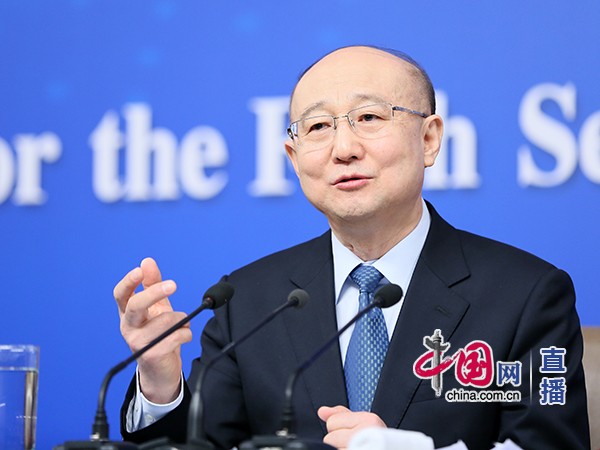E-commerce no safe haven for shoddy goods: regulator
- By Guo Yiming
 0 Comment(s)
0 Comment(s) Print
Print E-mail China.org.cn, March 15, 2017
E-mail China.org.cn, March 15, 2017
 |
|
Zhi Shuping, head of the General Administration of Quality Supervision, Inspection and Quarantine. [Photo by Gao Cong/China.org.cn] |
Chinese authorities are beefing up quality supervision for goods sold online amid increasing e-commerce activities in the country, said an official from the quality and inspection regulator in Beijing on March. 14.
E-commerce platforms are by no means a safe haven for counterfeit and shoddy goods, declared Zhi Shuping, head of the General Administration of Quality Supervision, Inspection and Quarantine.
Online retail sales in China reached 5.16 trillion yuan (US$752 billion) in 2016, a 26.2 percent growth from 2015 - more than double the growth rate of overall retail sales, according to China's National Bureau of Statistics, the agency charged with tracking economic data.
"As an emerging business form which provides convenience to the general public, e-commerce is also exploited by law breakers with illegal activities," said Zhi.
He said that a total of 2,122 types of sub-standard products have been detected and removed from e-commerce platforms last year, and that 31 percent of the goods were identified to be below the quality standard.
The regulator has stepped up supervision and services to ensure the healthy development of the e-commerce market as it is now assisting online shopping platforms to establish a quality management and control system and helping cross-border e-commerce vendors to engage in risk inspection, source tracking and credit management, said Zhi.
In 2016, more than 170,000 cases of IPR infringement and counterfeit products were dealt with and nearly 20,000 suspects arrested.
While stressing the protection of consumer's rights, Zhang Mao, director of State Administration for Industry & Commerce, revealed that China will introduce an interim measure on March 15, to allow the return and refund of online purchases within seven days.
According to statistics, 470 million out of the 700 million Chinese netizens are online buyers.
Chinese consumers are fulfilling some of their demands for premium products by buying imported goods online. The number of consumers who have purchased overseas products on Tmall Global, an online marketplace for imported goods, more than doubled in 2016, according to Tmall Global operator Alibaba Group Holding Ltd.
"We totally respect people's choice to buy goods abroad or on cross-border e-commerce platforms," said Zhi but confessed that related government agencies will also step up supervision to ensure their legitimate rights.
This year's government report suggests that the world's second largest economy will rev up quality upgrading and establish well-received world-class brands in order to meet people's increasing demand for premium goods.





